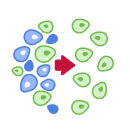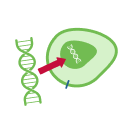The Fantastic Voyage of CAR T-cells
CAR T-cell therapy is a one-time treatment that uses the power of a person’s immune system to fight cancer. Watch the full process from collecting the patient’s white blood cells via apheresis to harvesting the CAR T cells at Kite’s manufacturing facility to returning the cells to the Authorized Treatment Center for infusion.
Cell Therapy Explained in 5 Steps
Each cell therapy we develop is uniquely designed for each patient, harnessing the power of the immune system to target and attack cancer. Our CAR T-cell therapy manufacturing process includes these 5 steps:





Elevating the Standard in Cancer Care
We are harnessing the power of cell therapy to transform cancer treatment today and build the next generation of cell therapies for tomorrow—all in the ultimate pursuit of a cure. Kite is dedicated exclusively to the research, development, manufacturing, and commercialization of cell therapy on a global scale. Our efforts are focused on all of these functions to deliver this highly specialized treatment to thousands of people in need.
Kite’s Global CAR T-cell Therapy Manufacturing Network
As the global cell therapy leader, Kite’s manufacturing is state-of-the-art with an end-to-end process that is predictable, reliable and flexible. From connecting with our case managers during the enrollment process to delivering Kite’s CAR T-cell therapies to more than 350 Authorized Treatment Centers around the world, our team is relentlessly focused on making it a priority that every patient who can benefit from CAR T has access to this therapy as early as possible.
End-to-End Manufacturing for Kite CAR T-cell Therapies
CAR T-cell therapy is an individualized, one-time treatment that is changing the way cancer is treated. Our technology uses the power of a patient’s own immune system to attack certain types of cancer cells. At Kite, the cell therapy manufacturing process is personal, from initial enrollment, to preparing a patient’s collection kit, to the moment their cells depart our manufacturing facility; our team is with patients every step of the way.
The Mechanism of Action of CAR T-cell Therapy
Stories of Hope
Find stories of hope, told by the people who motivate us every day to continue changing the standard in cancer care.



Frequently Asked Questions
We know patients, caregivers, and health care professionals may have questions when it comes to cell therapy. We want to try and answer some of them.
Our partnership with more than 570 treatment centers around the world is central to delivering cell therapies to patients successfully. Authorized Treatment Centers or ATCs (or Qualified Treatment Centers in the EU) are largely academic medical centers or large hospitals in the US that have gone through training and certification to administer cell therapy. Please see the current list of ATCs here: https://www.kitepharma.com/patient-resources/find-a-treatment-center.
There is robust healthcare coverage for cell therapies thanks to our work to demonstrate, particularly over longer periods of time, the value of this therapy as a one-time, potentially curative treatment.
- Multiple independent cost-effectiveness models, including some by the Institute for Clinical and Economic Review (ICER), have shown that cell therapy is cost-effective based on commonly cited US thresholds (costs and life years gained).
- Our therapies are widely covered in the US, by both private health insurance plans and Medicare and Medicaid – achieving over 99% reimbursement in the US.
- Outside the of the US, we have reimbursement for our products in more than 20 countries.
We are currently investigating multiple disease areas in a variety of blood cancer development programs, as well as second-generation cell therapy technology and solid tumors.
Information on all Kite trials can be found on ClinicalTrials.gov.
Pursuant to the 21st Century Cures Act: the posting of policies by manufacturers and distributors shall not serve as a guarantee of access to any specific investigational therapy by any individual.
